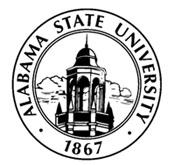Alabama State University
Alabama State University in Montgomery was founded by nine former slaves in 1867 as the Lincoln School of Marion, a private institution for blacks. The school's interim president is Leon Wilson, who stepped in after Gwendolyn Boyd was placed on administrative leave in November 2016.
The Lincoln School was incorporated on July 18, 1867 and opened November 13, 1867 with 113 students. In 1868, the Alabama State Board of Education designated the school as Lincoln Normal School. In December 1873, the State Board accepted the transfer of title to the school after a legislative act was passed authorizing the state to fund a Normal School, and George Card was named President. Thus, in 1874, this predecessor of Alabama State University became Alabama's first state-supported educational institution for African American students.
William Paterson was appointed as the second president in 1878. Paterson is recognized as a founder of Alabama State University and was the president for 37 of the first 48 years of its existence. He was instrumental in the move from Marion to Montgomery in 1887. Lincoln Normal School became a junior college in the decades that followed, and in 1928 became a four-year institution. In 1929, it became State Teachers College, Alabama State College for Negroes in 1948 and Alabama State College in 1954. In 1969, the State Board of Education approved a name change to Alabama State University.
The 1995 Knight vs. Alabama remedial decree declared ASU a comprehensive regional institution. This paved the way for two undergraduate programs, four graduate programs, diversity scholarship funding and endowment, funding to build a state-of-the art health sciences facility and a facility renewal allocation to refurbish three existing buildings.
Today, Alabama State University boasts an enrollment of more than 5,600 students from 42 states and 7 countries. One-third of the students are non-Alabama residents, and 11 percent are minorities. The university has a student-faculty ratio of 18 to 1.
Alabama State University is accredited by the Commission on Colleges of the Southern Association of Colleges and Schools. In 2004, ASU was noted as the nation’s number one producer of African-American teachers. ASU offers 47 degree programs including 31 Bachelors’, 11 Masters’, and two Education Specialists and three Doctoral courses of study. Since the remedial decree, the university has added a master of accountancy degree program, an occupational therapy program, a health information program, a clinical doctorate in physical therapy and will soon add a doctorate in microbiology followed by a forensic sciences program.
Presidents
- George N. Card, 1873-1878
- William Paterson, 1878-1915
- John William Beverly, 1915-
- George Washington Trenholm,
- Harper Councill Trenholm, 1925-1962
- Levi Watkins (interim), 1962-
- Robert Lee Randolph, 1981-1983
- Leon Howard, 1984-1991
- C. C. Baker, 1991-1994
- William H. Harris, June 1994–April 2000
- Joe A. Lee, 2001-2008
- William H. Harris (interim), 2008
- William H. Harris (2nd term), 2008–September 2012
- Joseph Silver, September–December 2012
- William H. Harris (interim), December 2012–2014
- Gwendolyn Boyd, 2014-2016
- Leon Wilson (interim), 2016-2017
- Quinton Ross, 2017-
Athletics
The Alabama State University Hornets participate in men's intercollegiate football, baseball, basketball, golf, tennis, track and cheerleading along with women's intercollegiate basketball, soccer, softball, bowling, tennis, track, volleyball, golf and cheerleading. Sports teams participate in NCAA Division I (FCS - Football Championship Subdivision for football) in the Southwestern Athletic Conference (SWAC), which it joined in 1982. The university's colors are black and gold.
Since 1985 the Hornets football program has been penalized by the NCAA four times. Most recently the NCAA investigated recruiting violations which occurred during the tenure of head football coach L. C. Cole in 2000 and 2001. In December 2008 the NCAA placed the university of a five-year probation, banned the Hornets from post-season play in 2009, and stripped the football team of its 2000 and 2001 record. The sanctions came in addition to self-imposed scholarship reductions.
Notable Alumni
- Ralph Abernathy, Civil Rights leader
- Reggie Barlow, football player and coach
- Chandra Davis, reality show contestant
- Togo Coles, tennis player
- James Daniels, football coach
- Fred Gray, attorney
- Kefla Hare, actor
- Erskine Hawkins, jazz musician
- Tarvaris Jackson, football player
- Yvonne Kennedy, President of Bishop State Community College
- Darryl Lassiter, producer and director
- Woody McCorvey, football coach
- Tangy Miller, actress
- Africa Miranda, singer
- Rosa Parks, civil rights pioneer
- Joe L. Reed, Civil Rights activist
- Eddie Robinson, football player
- Fred Shuttlesworth, clergy, civil rights legend
- Rickey Smiley, comedian/actor
- Jesse White, 37th Secretary of State of Illinois
- Doug Williams, actor, comedian
- Marcus Winn, football player
References
- Caver, Joseph (1982) A Twenty-Year History of Alabama State University, 1867–1887. Master's thesis, Alabama State University
- Watkins, Levi (1987) Fighting Hard: The Alabama State University Experience. Detroit, Michigan: Harlo Press
- Knight v. Alabama (1991) 933 F.2D. 1991
- Westhauser, Karl E., Elaine M. Smith, & Jennifer A. Fremlin, eds (2005) Creating Community: Life and Learning at Montgomery's Black University. Tuscaloosa: University of Alabama Press
- "Alabama State University" (July 17, 2007) Wikipedia - accessed July 22, 2007
- Perrin, Mike (December 11, 2008) "Alabama State Hornets given five years' probation, stripped of wins, banned from postseason for multiple violations." The Birmingham News
External Links
- Alabama State University website
